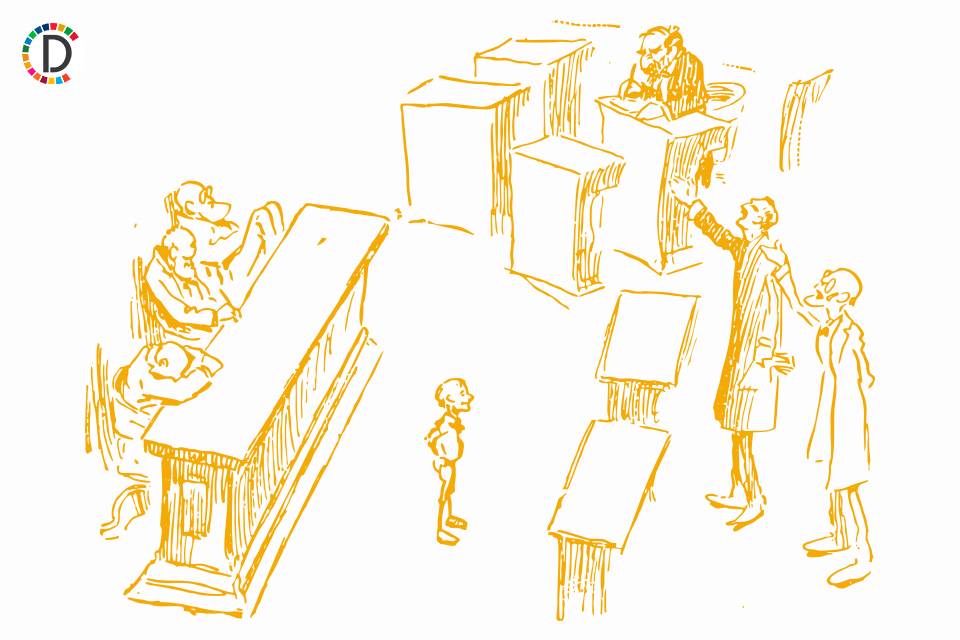Can courts interfere in disputes over properties of erstwhile princely states? SC to examine
Similar claims were raised for other properties, currently valued at thousands of crores.On April 17, the high court rejected the claims of the erstwhile royal family of Jaipur that town hall, old police headquarters, old home guard general directorate, and the old accountant office complex at Jaleb Chowk all of which are situated in walled city are government properties.It also decreed that no civil court could entertain any claims related to the present case.The order allowed four revision petitions filed by the state government against a subordinate courts order.

- Country:
- India
The Supreme Court on Monday agreed to examine whether Article 363 of the Constitution bars courts from hearing disputes relating to properties of erstwhile princely states mentioned under the pre-constitutional covenants.
Article 363 bars the interference of courts in any disputes which may arise from certain treaties, agreements, covenants, sanad, engagements, etc., executed between a princely state and the Government of India.
A bench of Justices Prashant Kumar Mishra and Augustine George Masih, therefore, issued notice on a plea filed by members of Jaipur's royal family including Rajmata Padmini Devi, deputy chief minister Diya Kumari and Sawai Padmanabh Singh over the possession of the Town Hall (Old Vidhan Sabha) and other properties situated in the walled city.
They have challenged the decision of Rajasthan High Court, which held that suits seeking possession of the Town Hall, mentioned in the covenant between the erstwhile princely state and the Union of India, couldn't be entertained by civil courts under Article 363 of the Constitution.
Senior Advocate Harish Salve, appearing for the royal family members, contended that the covenant in question was entered into by five princes whereas the Government of India was only a guarantor to ensure that the terms were fulfilled.
He pointed out that this aspect was not argued in the proceedings before the high court, which resulted in an impugned judgement of April 17.
Justice Mishra, however, asked Salve if the Government of India was not a party, how did the merger with the Union of India happen.
Salve clarified that the merger occurred after the covenant, with the onset of Article 1 of the Constitution.
Justice Mishra said going by the arguments of Salve, it would mean that if the Union of India was not a party to the covenant and, therefore, Article 363 would not apply then the situation would essentially lead to every other ruler filing a suit and asking for their property to be returned.
Salve said filling a suit and having a right (over the property) were two different things.
He clarified that it was not the case of the petitioners to claim ownership over properties that were constitutionally vested with the state in line with the covenant, irrespective of Article 363.
''Nobody has the right to what is vested with the state...it's finished, it's over. And if I was to ever question the inventory, it would be barred with or without 363 and I'd make that good.'' Justice Mishra, who was not convinced by Salve's arguments, said, ''Tomorrow, you will say the entire Jaipur is yours. This way every, princely state will come forward and declare independence.'' The bench agreed to hear the matter in detail and issued notice to Rajasthan government noting two more suits were likely to be filed in the matter.
Additional Advocate General Shiv Mangal Sharma, appearing for Rajasthan government, said given the longevity of the matter, the state would not precipitate the issue and maintain status quo on the disputed properties.
The bench posted matter after eight weeks as it recorded Sharma's statement.
The matter related to the long-standing multi-property dispute between the former royal family of Jaipur and the state government.
The disputed properties – town hall, old police headquarters, old home guard general directorate, and the old accountant office complex at Jaleb Chowk – are currently in the government's possession.
The members of royal family had initially filed four suits before the civil court for mandatory injunction, possession, permanent injunction, and recovery of mesne profit for Town Hall.
It was contended that the Town Hall was in official use only till 2001, and thereafter a new Vidhan Sabha building was constructed and it was not put to official use. Similar claims were raised for other properties, currently valued at thousands of crores.
On April 17, the high court rejected the claims of the erstwhile royal family of Jaipur that town hall, old police headquarters, old home guard general directorate, and the old accountant office complex at Jaleb Chowk — all of which are situated in walled city are ''government properties''.
It also decreed that no civil court could entertain any claims related to the present case.
The order allowed four revision petitions filed by the state government against a subordinate court's order.
(This story has not been edited by Devdiscourse staff and is auto-generated from a syndicated feed.)
- READ MORE ON:
- The Supreme Court
- Article 363
- Sharma
- Rajasthan High Court
- Article 363 of the
- Town Hall
- Harish Salve
- Article 363.
- Vidhan Sabha
- Rajasthan
- Salve
- Article 363 of the Constitution
- Mishra
- Augustine George Masih
- Kumar Mishra
- the Union of India
- Constitution
- Shiv Mangal Sharma
- Rajmata Padmini Devi
- Justice Mishra
ALSO READ
Green Light for Jaipur Metro Phase-2: A Step Forward in Urban Mobility
Sweets with a Patriotic Twist: 'Pak' to 'Shree' in Jaipur
Laughter Yoga Brings Joy to Jaipur Police: A Step Towards Stress Relief
Jaipur Airport: Rising Air Travel and Strategic Investments Elevate Passenger Traffic
Crunch Time in Jaipur: Mumbai Indians Face Punjab Kings with Playoff Stakes High










